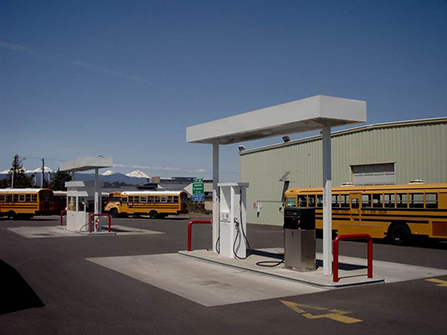Bend-LaPine Schools, the seventh-largest school district in Oregon, has realized some impressive benefits by converting 40 percent of its school bus fleet to buses fueled by propane autogas. Those benefits include a 57 percent reduction in fuel costs, and 169,000 pounds of carbon dioxide eliminated from the district’s carbon footprint, during the lifetime of each bus.
The district transports about 5,000 students to school each day on 120 daily bus routes. The school district’s attendance area spans over 1,600 square miles, comprising 28 schools.
In 2009, Bend-La Pines Schools’ director of transportation, Denice Blake, recognized a need to replace aging diesel buses, some over 30 years old. “I had attended a local conference and test-drove a Blue Bird Propane Vision bus,” said Blake. “I was impressed with its power and quiet ride, especially since it ran on a clean-operating, affordable fuel.”
The school district ordered 21 propane autogas fueled buses in its initial purchase. Since then, it added four more one year later and 32 Blue Bird Propane Vision Type C school buses for the 2014-2015 school year.
The school district saw immediate cost reduction in the price of fuel with propane autogas versus diesel. Currently, Bend-La Pine Schools pays $1.31 per gallon for autogas and $3.11 for diesel. “We are saving thousands of dollars a year using autogas compared to diesel fuel,” said Dave Voiles, the school district’s service manager. Historically, autogas costs about 50 percent less than diesel.
Along with the cheaper cost of the fuel, the school district defrayed some of the costs of the initial fueling infrastructure and bus purchase with the Business Energy Tax Credit from the State of Oregon. While propane infrastructure is the least expensive of all alternative fuels, it obtained funding from the Oregon Department of Education, which reimburses all school district’s transportation operational expenses by 70 percent.
The business benefits are clear to the district – a 57 percent reduction in fuel costs is pretty substantial, and most of that is due to the fact that propane autogas fuel is so substantially cheaper than diesel. But it also runs cleaner, which benefits everyone.
From a practical standpoint, the district has heard from parents that there is a lack of a “dust cloud” that they and their children are exposed to at bus stops.
Cold weather is not an operational barrier to the use of autogas. District officials report that Bend-La Pine’s autogas bus fleet averages 95 percent reliability. By comparison, its newest diesel buses run at 60 to 65 percent reliability. “We have had challenges with diesel fuel due to gelling issues,” said Voiles. “With overnight sub-zero temperatures, we couldn’t keep diesel buses running because of the ever-changing quality of the fuel. This hasn’t been an issue with our propane autogas buses.”
The school district installed two private propane autogas stations to accommodate its new buses. Its first station is located at the busier Bend yard with two autogas dispensers and two 2,000-gallon aboveground tanks. These pumps can fuel four buses at one time. At its La Pine yard, a 2,000-gallon aboveground tank and single dispenser was installed, which can fuel one bus at a time.
Bend-La Pine Schools plans to continue to increase its autogas bus fleet to 100 buses.
Keypoints:
• A 57 percent reduction in fuel costs. The current price per gallon for propane autogas is $1.31, vs. $3.11 for diesel.
• 145,000 gallons of diesel displaced per year by switching to propane autogas .
• About 169,000 pounds of carbon dioxide eliminated from the district’s carbon footprint during the lifetime of each bus.
• An average of 95 percent reliability in the cold temperatures of central Oregon for the propane autogas buses, vs. about 65 percent reliability for the newest diesel buses.





